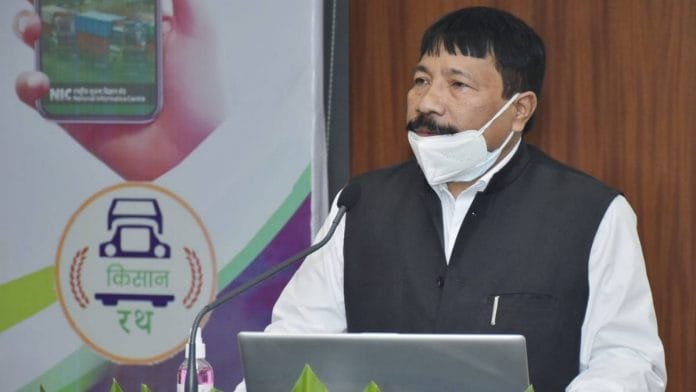Guwahati: Assam Agriculture Minister and Asom Gana Parishad (AGP) president Atul Bora has hinted that the regional party will continue its alliance with the ruling BJP government for next year’s assembly elections.
However, Bora said in an interview with ThePrint that his party’s focus will be on implementing Clause 6 of the Assam Accord, 1985, that would provide ‘constitutional, legislative and administrative safeguards’ to the Assamese people.
“The previous government did nothing for the implementation of the clauses of the Assam Accord. The problem of illegal immigrants remains the same. When the Narendra Modi government came into power, we expected a solution… Still hoping for a permanent solution to the problem. It should be settled once and for all,” Bora said.
“The Assamese people have been suffering for long. Infiltration is a threat to the identity of the indigenous people. We want Clause 6, which is the soul of the Assam Accord, to be implemented,” he explained.
Bora also refused to elaborate on the AGP’s stance on the Citizenship Amendment Act (CAA), that grants Indian citizenship to persecuted non-Muslim minorities from Bangladesh, Pakistan and Afghanistan who entered India on or before 31 December 2014. He merely said the party’s “stance is very much clear”.
AGP’s ‘realpolitik’
In December 2019, the AGP had filed two separate writ petitions in the Supreme Court against the CAA, with party leaders even considering breaking ties with the BJP over the contentious legislation. That did not happen. AGP’s lone MP in the Rajya Sabha, Birendra Prasad Baishya, had opposed the Citizenship Amendment Bill in Parliament, but later voted in its favour.
Political analysts ThePrint spoke to said the BJP continues to be a “safe harbour” for the regional party, prompting its leaders to keep a safe distance from the CAA.
“It is realpolitik that has forced AGP to lie low on the CAA agenda. They had withdrawn support from the government and even went solo for the panchayat polls last year, but the public refused to accept them,” political analyst Shyamkanu Mahanta told ThePrint.
He added, “The AGP has realised that CAA is not the issue. They want to stay in the government and concentrate on Clause 6.”
Bora, meanwhile, is confident that the central government “will implement the suggestions of the high-powered committee” that has been appointed by the Union home ministry for the implementation of Clause 6.
The committee, led by retired judge Biplab Sarma, had finalised a 91-page report on 10 February this year after holding consultations with various stakeholders. The report was submitted to Chief Minister Sarbananda Sonowal on 25 February.
“After 35 long years, a committee was formed headed by Justice Sarma and under the present government of Prime Minister Narendra Modi — it’s a good sign and we are positive. We are expecting something. When we met the Union Home Minister Amit Shah earlier, he also assured us that the central government will implement the suggestions given by the committee,” Bora said.
Also read: As Assam grants Bodo language official status, here’s all you need to know on Bodoland struggle
‘Mahanta was not architect of AGP’
Bora also said that former Assam chief minister and founder president of the AGP, Prafulla Kumar Mahanta, had no role to play in the party’s creation. But he said they continue to work together “despite differences”.
“He (Mahanta) was not the architect of AGP; the people of Assam created the party. He led the Assam movement during the 1980s, as president of the All Assam Students’ Union. The All Assam Gana Sangram Parishad was later formed and people from different parts of the state joined the movement. It was a mass movement, after which the AGP was formed,” Bora said. “We have been working together, though we have differences in opinion.”
The AGP was formally launched in October 1985 in Upper Assam’s Golaghat district. Mahanta, the party’s first president, was elected as the youngest chief minister of the state in 1985. The AGP has formed the government twice — from 1985 to 1990 and from 1996 to 2001.
Asked about the prospect of new regional parties that have been launched in Assam ahead of the elections, Bora maintained that the AGP will remain “the pillar of regionalism in Assam”.
“During the time of the Assam movement, we had seen many regional parties. But AGP remains the pillar of regionalism in Assam. We believe in regionalism and we are a secular party,” he said.
Also read: Congress and AIUDF inching closer to Assam alliance, announcement expected soon






